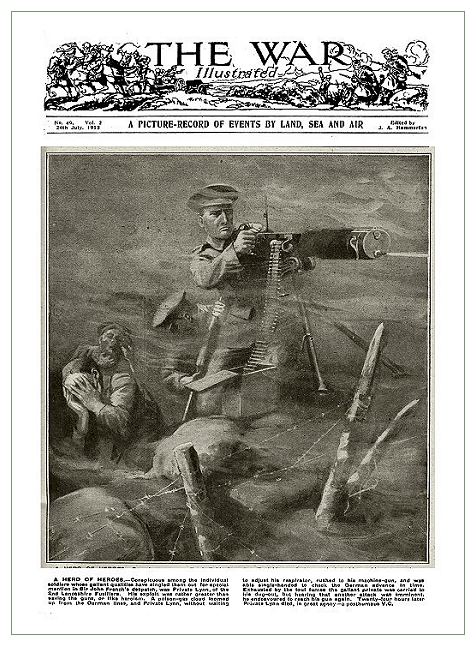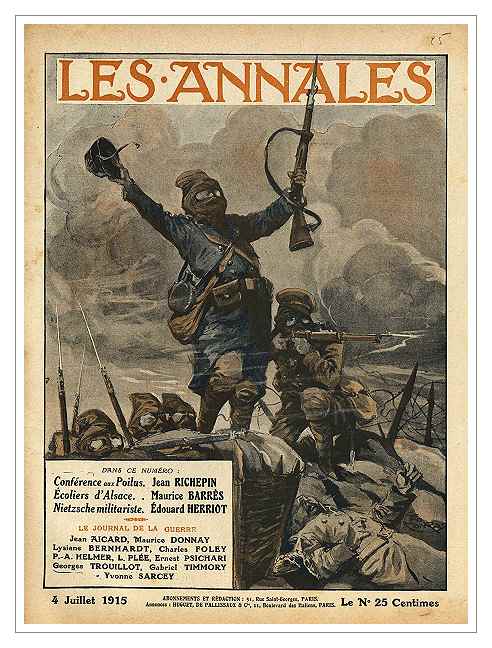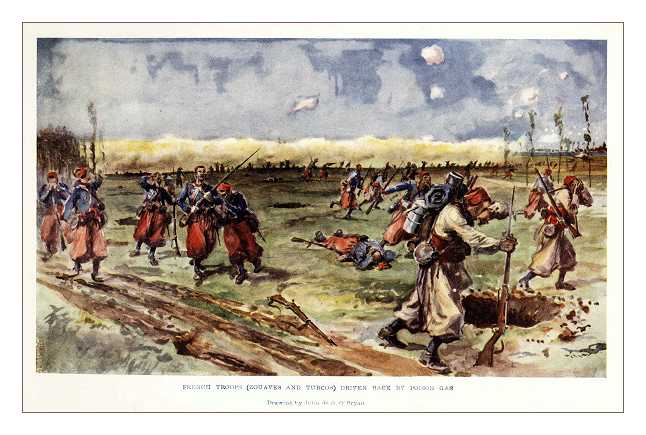

Better Fighting through Chemistry


It was Thursday evening, April 22nd, 1915. In a meadow off the Poperinghe-Ypres road, the men of the Queen Victoria Rifles were taking their ease. We had just fought our first big action in the fight for Hill 60. We had had a gruelling time, and had left many of our comrades on its slopes. We survivors were utterly spent and weary; but we felt in good heart, for only an hour ago we had been personally congratulated by Sir John French, also the Army Commander, General Smith-Dorrien.
Now some of us were stretched out asleep on the grass, others making preparations for a much-needed toilet. Our cooks were preparing a meal, and on our right a squad of Sappers were busily erecting huts, in which we were to sleep. Alas! we never used them. As the sun was beginning to sink, this peaceful atmosphere was shattered by the noise of heavy shell-fire coming from the north-west, which increased every minute in volume, while a mile away on our right a 42-cm. burst in the heart of the stricken city of Ypres.
As we gazed in the direction of the bombardment, where our line joined the French, six miles away, we could see in the failing light the flash of shrapnel with here and there the light of a rocket. But more curious than anything was a low cloud of yellow-grey smoke or vapour, and, underlying everything, a dull, confused murmuring.
Suddenly, down the road from the Yser Canal came a galloping team of horses, the riders goading on their mounts in a frenzied way; then another and another, till the road became a seething mass, with a pall of dust over all.
Plainly something terrible was happening. What was it? Officers, and Staff Officers, too, stood gazing at the scene, awestruck and dumbfounded; for in the northly breeze there came a pungent, nauseating smell that tickled the throat and made our eyes smart. The horses and men were still pouring down the road, two or three men on a horse, I saw, while over the fields streamed mobs of infantry, the dusky warriors of French Africa; away went their rifles, equipment, even their tunics, that they might run the faster. One man came stumbling through our lines. An officer of ours held him up with levelled revolver. "What's the matter, you bloody lot of cowards?" says he. The Zouave was frothing at the mouth, his eyes started from their sockets, and he fell writhing at the officer's feet. " Fall in.! " Ah ! we expected that cry; and soon we moved across the fields in the direction of the line for about a mile. The battalion is formed into line, and we dig ourselves in.
It is quite dark now, and water is being brought round, and we hear how the Germans have, by the use of poison gas, driven a French army corps out of the line, creating a huge gap which the Canadians have closed pro tern. A cheer goes up at this bald statement, though little we knew at what a cost those gallant souls were holding on.
About midnight we withdrew from our temporary trenches and marched about for the rest of the night, till at dawn we were permitted to snatch what sleep we could under a hedge. About the middle of the morning we were on the move again, to the north, and were soon swinging along through Vlamertinghe. About two miles out of that town we halted in a field. By this time we had joined up with the remainder of our Brigade. the i3th, and, after a meal had been served, we were ordered to dump our packs and fall in by companies. Here our Company. Commander, Captain Flemming, addressed us. "We are," he said, tired and weary men who would like to rest; however, there are men more weary than we who need our help. We may not have to do much; we may have to do a great deal. Whatever happens, fight like hell. I shall at any rate." A few moments more-then off we go again towards that incessant bombardment, which seemed to come closer every minute.
The Scottish Borderers led the Brigade, followed by the Royal West Kents, then ourselves-all with bayonets fixed, for we were told to be prepared to meet the Germans anywhere on the road.
We were now in the area of the ill-fated French Colonial Corps. Ambulances were everywhere, and the village of Brielen, through which we passed, was choked with wounded and gassed men. We were very mystified about this gas, and had no protection whatever against it.
Shortly after passing through Brielen we turned to the left down a road which led to the Canal, along the south side of which ran a steep spoil bank, and, as the head of our battalion reached this, we halted. We could see nothing of what went on on the other side, but knew by the rattle of musketry that there was something doing. So there was, for when we finally crossed the pontoon we found that the Jocks had met the Germans on the north bank and had bundled them helter-skelter up the slope to Pilckem. This saved us any dirty work for that day, so we spent the rest of it till midnight in carrying supplies and ammunition to the Jocks and Kents, and after-wards lay in reserve on the Canal bank. It froze hard that night, and after the sweating fatigue of carrying boxes of S.A.A. all night we were literally aching with cold.
All night there seemed to be a spasmodic bombardment all round the Salient.
Next morning about 12 o'clock the Adjutant, Captain Culme-Seymour, was chatting to Captain Flemming a few paces away from where I was lying, when up rushed a breathless despatch rider and handed him a message, which he read aloud to Flemming. I caught three words, "Things are critical." In about five minutes the Colonel had the battalion on the move. We moved off in double file by companies, our company leading; as we did so a big shell burst in the midst of "D" Company, making a fearful mess. We moved on quickly, like a gigantic serpent, with short halts now and then. As we skirted Ypres there was a roar of swift-moving thunder and a 17-inch shell, which seemed to be falling on top of us, burst a quarter of a mile away, covering us with dirt.
Over meadows and fields green with young crops which would never be harvested, past cows peacefully grazing that had had their last milking, we went, passing curiously unperturbed peasants, who watched us from the farms and cottages.
As we crossed the Roulers road a lone cavalryman came galloping down it, hatless and rolling in his saddle as though drunk. Some wag throws a ribald jest at him. He turns his ashy face towards us, and his saddle it seems is a mess of blood. Above us a Taube appears and, hovering over us, lets fall a cascade of glittering silver-like petals. A few moments more and shells begin to fall about us in quantities, and gaps begin to appear in our snake-like line.
We pass a field battery; it is not firing, as it has nothing to fire, and its commander sits weeping on the tail of one of his useless guns. We quicken our pace, but the shelling gets heavier. It seems to be raining shrapnel. Captain Fleraming falls, but struggles to his feet and waves us on with encouraging words. We double across a field, and in a few moments come on to the road again. Here was action indeed, for barely had we reached the road and started to work our way towards St. Julien, than we found ourselves amongst a crowd of Canadians of all regiments jumbled up anyhow, and apparently fighting a desperate rearguard action. They nearly all appeared to he wounded and were firing as hard as they could. A machine gun played down the road. Then comes an order: "Dig in on the roadside." We all scrambled into the ditch, which~, like all Flanders ditches, was full of black, liquid mud, and started to work with entrenching tools-a hopeless job. A woman was bringing jugs of water from a cottage a few yards away; evidently she had just completed her week's washing, for a line of garments fluttered in the garden.
"Dig I Dig for your lives !" shouts an officer. But, dig! How can we? 'Tis balers we need.
A detonation like thunder, and I inhale the filthy fumes of a 5.9 as I cringe against the muddy bank. The German heavies have got the road taped to an inch. Their last shell has pitched on our two M.G. teams, sheltering in the ditch on the other side of the road. They disappear, and all we can hear are groans so terrible they will haunt me for ever. Kennison, their officer, stares dazed, looking at a mass of blood and earth. Another crash, and the woman and her cottage and water jars vanish and her pitiful washing hangs in a mocking way from her sagging clothes line. A bunch of telephone wires falls about us. To my bemused brain this is a catastrophe in itself, and I curse a Canadian Sapper beside me for not attempting to mend them. He eyes me vacantly, for he is dead. More and more of these huge shells, two of them right in our midst. Shrieks of agony and groans all round me. I am splashed with blood. Surely I am hit, for my head feels as though a battering-ram has struck it. But no, I appear not to be, though all about me are bits of men and ghastly mixtures of khaki and blood.
The road becomes a perfect shambles. For perhaps half a minute a panic ensues, and we start to retire down the road. But not for long. Colonel Shipley stands in the centre of the road, blood streaming down his face. The gallant Flemming lies at his feet, and the Adjutant, Culme-Seymour, stands in a gateway calmly lighting a cigarette.
"Steady, my lads," says the Colonel. "Steady, the Vics Remember the regiment." The panic is ended.
"This way," says Seymour. "Follow me through this gate here." As we dash through the gate, I catch a glimpse of our M.O. working in an empty gun-pit like a butcher in his shop. Many were the lives he saved that day.
Once through the gate we charge madly across a field of young corn. Shrapnel and machine-gun bullets are cracking and hissing everywhere. Ahead of us is a large farm, and advancing upon it at almost right angles to ourselves is a dense mass of German infantry.
We are carrying four extra bandoliers of ammunition as well as the rest of our equipment. Shall I ever get there? My limbs ache with fatigue, and my legs are like lead. But the inspiring figure of Seymour urges us on, yet even he cannot prevent the thinning of our line or the gaps being torn in it by the German field gunners, whom we can now plainly see.
At last we reach the farm, and we follow Culme-Seymour round to its farther side. The roar of enemy machine guns rises to a crazy shrieking, but we are past caring about them, and with a sob of relief we fall into the farm's encircling trench. Not too soon, either, for that grey mass is only a few hundred yards off, and "Rapid fire! Let 'em have it, boys!" and don't we just! At last a target, and one that we cannot miss. The Germans fall in scores, and their batteries limbered up and away.
At last we have our revenge for the discomfort of the afternoon. But the enemy re-form and come on again, and we allow them to come a bit nearer, which they do. We fire till our rifles are almost too hot to hold, and the few survivors of our mad quarter of an hour stagger back. The attack has failed, and we have held them, and thank God that we have, for, as our next order tells us, "This line must be held at all costs. Our next is more big attacks, though the enemy set fire to the farm and nearly roasted us, though our numbers dwindled and we were foodless and sleepless, till, thirty-six hours later, we were relieved in a misty dawn, and crept back through burning Ypres for a few hours' respite.

French Turcos retreating before the cloud of poisin gas at Ypres